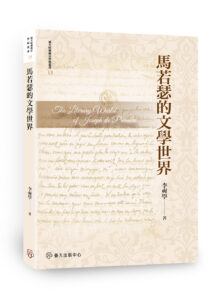
Sher-shiueh Li 李奭學
NTU & HYI Academic Book Series No. 13
National Taiwan University Press, November 2022
About the book: Joseph de Prémare was a French Jesuit, who came to Jianxi, China, in the reign of Emperor Kangxi. He was banished to Guangzhou by the next Emperor Yonzheng who had been hostile to Catholicism. Drawing on Cicero’s “Dream of Scipio,” Prémare wrote a story in classical Chinese titled “Dreaming about Paradise” (“Meng Meitu ji”) and in vernacular Chinese he wrote a novella titled Confucianism Befriending the Apostolic Creed (Rujiaoxin). Both texts began the tradition of “missionary novels” in the Qing dynasty. In Guangzhou, Prémare translated eight poems from the Shijing (Classic of Odes), followed immediately by his most famous rendition of The Orphan of Zhao, a play that influenced European theatre greatly in the eighteenth century. Prémare also compiled a book, Notitia linguæ sinicæ, on the grammar and rhetoric of the Chinse language in 1728, wherein he showcased his enormous knowledge of Chinese literature, both classical and vernacular. The present book explores in depth the argument and theme of these five works, elaborating particularly on how Prémare enlisted “Jesuit figurism” to structure them.
馬若瑟是法國耶穌會士,康熙年間抵江西,晚年遭雍正流放於廣州。在江西,馬若瑟用文言文寫下短篇之作〈夢美土記〉,又用白話寫出中篇小說《儒交信》,俱屬清代所謂「傳教士小說」的嚆矢。在廣州,馬若瑟法譯了八首《詩經》中的詩,是為《詩經》西傳之始,又法譯了元人紀君祥的戲《趙氏孤兒》,是為中國戲劇法譯的前驅之作。這兩份翻譯文本,杜赫德俱收於1735年刊行的《中華帝國全志》之中,中國文學因此開始流布全歐。馬若瑟的翻譯與創作,大多具有耶穌會中國經籍索隱派的色彩。1728年,馬氏在粵另又編譯完成《漢語劄記》一書,其中引例幾乎都出自中國經典與說部,可見他中國文學知識之精與廣。本書勾稽上述馬氏著譯的隱意,揣度他筆下的關懷,一窺他風格獨特的文學世界。
About the NTU & HYI Academic Series: The book series, published by National Taiwan University Press, is a collaboration between the Harvard-Yenching Institute and the College of Liberal Arts of National Taiwan University. The Series publishes scholarly monographs in Chinese which make a major original contribution to the humanities and social sciences. Interdisciplinary studies are especially welcome. Submissions are encouraged from all Chinese-speaking regions and beyond. For more information about the NTU-HYI series, please visit the NTU Press website.
